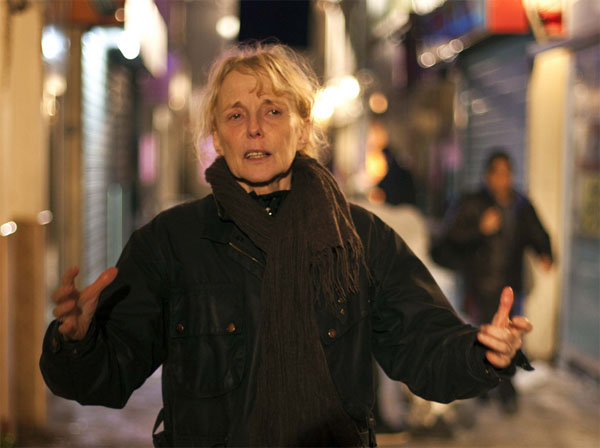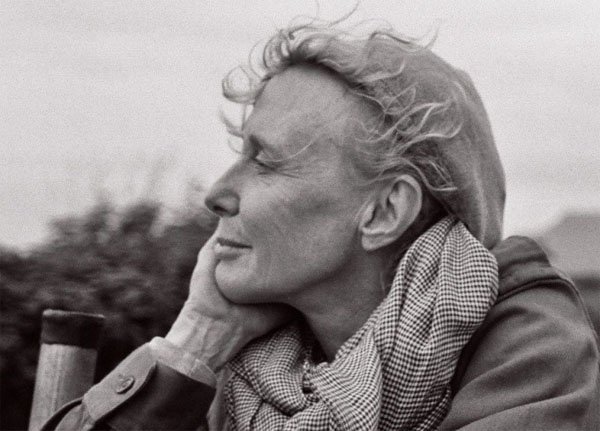Born in Paris on this day 65 years ago, Claire Denis will see her new film, Les Salauds (The Bastards), premiere in Un Certain Regard at Cannes next month. “After a disappointing experience of studying economics, Claire Denis enrolled in the Institut des Hautes Études Cinématographiques (now École Nationale Supérieure des Métiers de l’Image et du Son) where she graduated in 1971.” So reads her biography at the European Graduate School. “At the beginning of her film career, she worked as an assistant director to Dušan Makavejev, Costa Gavras, Jacques Rivette, Jim Jarmusch and Wim Wenders. Claire Denis made her film debut in 1988 with Chocolat, a luminous depiction of malaise of the post-colonial world.”
The biography then runs through the oeuvre: Man No Run (1989), “a documentary about a Cameroon band Les Têtes Brulées on their first tour in France”; S’en fout la mort (No Fear, No Die, 1990), “about two men, one from Benin and one from Caribbean” who “become involved in an illegal cock-fighting ring”; J’ai Pas Sommeil (I Can’t Sleep, 1994), “introducing the cultural as well as familial tensions at work among various immigrants”; Nénette et Boni (Nenette and Boni, 1996), “about a lovelorn brother and his pregnant teenage sister after the suicide of their mother”; Beau Travail (Good Work, 1998), loosely based on Melville’s Billy Budd; Trouble Every Day (2001), “with Vincent Gallo and Beatrice Dalle as carriers of a blood-hungry virus released by erotic stimulation”—it “shocked Cannes audiences”; Vendredi soir (Friday Night, 2002), about “a passionate one-night stand” (see GreenCine’s 2003 interview by Craig Phillips, with Jonathan Marlow); L’Intrus (The Intruder, 2004), Denis’s “most mysterious and invigorating work”; 35 rhums (35 Shots of Rum, 2008), focusing on “the integrity of a small family of two, surrounded by the network of others whining to get in”; and Matériel Blanc (White Material, 2009), depicting a a white family in Cameroon “surrounded by unrest and rebellion.”
And it was in 2009 that Reverse Shot presented its symposium on Denis. Wrote editors Michael Koresky and Jeff Reichert: “In visualizing lives on the margins as sensually as another filmmaker might the halls of Versailles or the lights of a shimmering Christmas tree, French director Claire Denis has positioned herself, in our eyes at least, among the first rank of international auteurs. She does something nearly unthinkable in a world cinema scene obsessed with provocateurs like Haneke and Von Trier: she chooses to please rather than pillory her audience, invite into a dialogue around images rather than read sermons from on high. Like her compatriot and contemporary Olivier Assayas, Denis seems to have decided that, in the long, long shadow cast over French cinema by Godard’s early output, the most radical thing to do is not to eschew or batter narrative, but to wrestle with and redefine it, all without losing sight of the essential satisfactions of storytelling. This isn’t to suggest her films are films are easy on the mind, though they are always easy on the eyes. Her camera doesn’t just capture; it caresses.”
Along with Adam Nayman‘s interview with Denis, the symposium features Damon Smith‘s piece on her music videos, Leo Goldsmith‘s on her early career, Kevin B. Lee‘s video essay on L’Intrus, and essays on the major features up to 35 Shots of Rum.
Earlier that year, Catherine Grant presented a massive roundup of “more than sixty links to freely-accessible, mostly scholarly (or otherwise top-notch) material about Denis’s work.” And if even that mighty collection won’t do you, head back to the European Graduate School for a bibliography, more articles and links, quotes even, and—this is kind of amazing—videos of Denis discussing her own work, Faulkner, narrative, and more.
One more brief shot of viewing (4’23”). The BFI‘s posted a clip of Denis discussing 35 Shots of Rum.
For news and tips throughout the day every day, follow @KeyframeDaily on Twitter and/or the RSS feed. Get Keyframe Daily in your inbox by signing in at fandor.com/daily.





